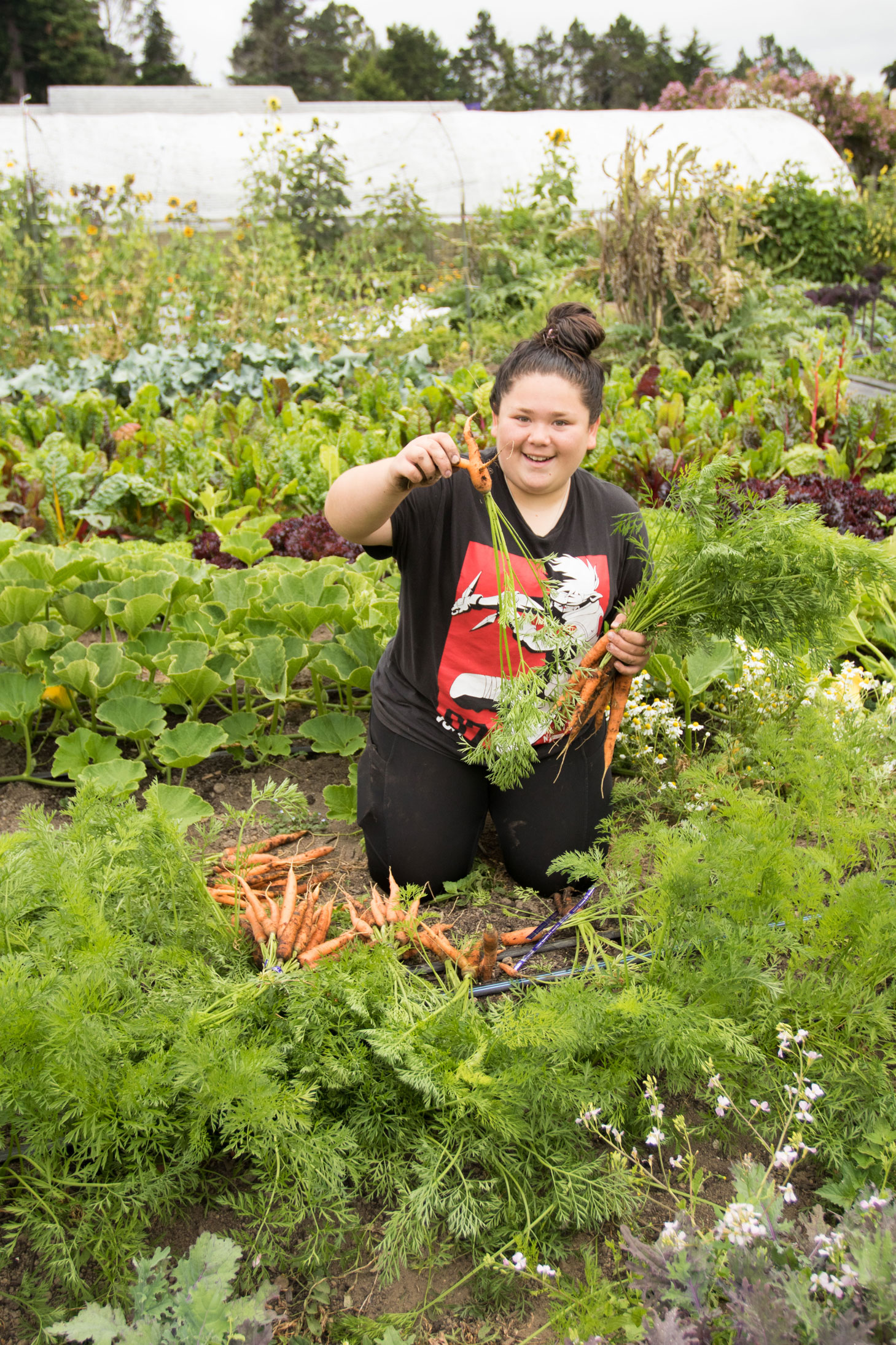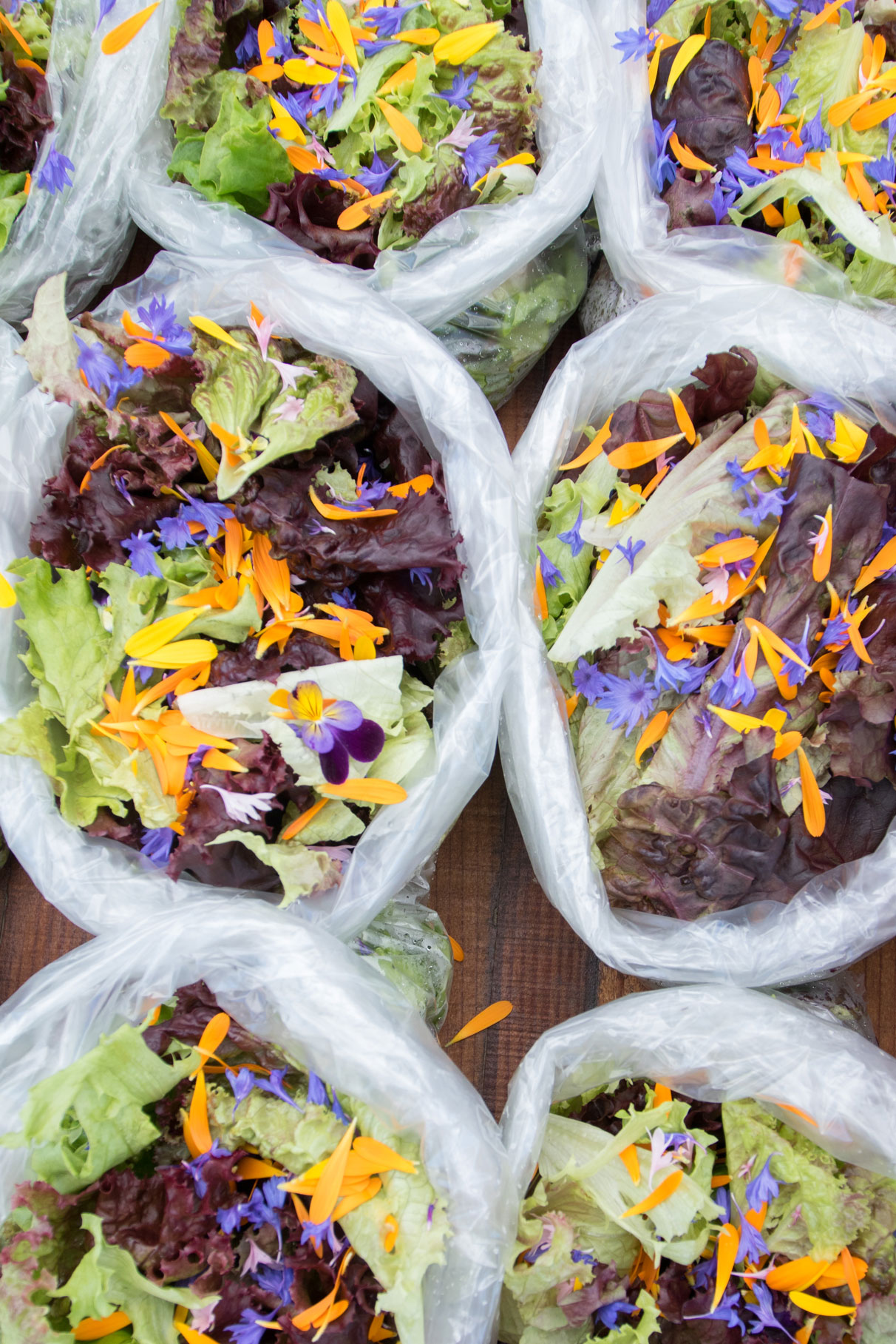Noyo Food Forest

by Anna Levy
photos by Ree Slocum
It is one of the final days of the 2019 summer season, and there are several teenage interns still hard at work in the gardens at the Noyo Food Forest. Among the tomatoes, kale, artichokes, peas, and much more—some of which will be sold at upcoming farmers markets, school cafeterias, and through other avenues—it is easy to see that the students work with a sense of pride and a confidence grown from spending much of the summer in the dirt.
That is, of course, by design. The Noyo Food Forest, with its signature Learning Garden spread out over roughly half an acre on the Fort Bragg High School campus, was founded in 2006 by three coastal residents—Katrina Aschenbrenner, Susan Lightfoot, and Kim Morgan—who envisioned accessible garden spaces for the community to use. From their initial work, Director Emily Forster explains, the Learning Garden has “sprouted as the flagship project and has evolved to the current center of agriculture education and the farm-to-school program.”
To that end, each year the organization pulls in about 25 interns from local schools. The program, like a food forest itself, is multi-layered. Interns, who must have completed 8th grade and range from 14-19 years of age, are tasked with the many activities that go into farming successfully, including planting, weeding, harvesting, and washing. They also attend workshops, participate in community-building activities, and sell produce at farmers markets, including those in Fort Bragg and Mendocino. Overall, they contribute to the annual growth of “about 4,500 pounds of food that is consumed,” says Emily.
In exchange for their work, whether during the summer season or in the after-school program that runs Tuesday-Thursday for much of the academic year, interns earn a stipend. That has remained a priority, though there’s no dedicated financial support for it; the money all comes from additional fundraising and donations. Equally valuable, though, is the fact that interns have a chance to acquire skills that can be used well beyond the end of the internship experience. Among other things, students gain knowledge, confidence, and a stronger sense of responsibility over the course of their time with the organization. “I truly see a transformation for some of them between day one and the end of the program,” Emily notes.
It is not, however, only through the internship program that the Noyo Food Forest influences coastal residents. The non-profit also aims to positively impact the larger community, making the process of growing food more accessible to anyone who is interested. The organization hosts field trips for preschool students as well as those in Kindergarten through 8th grade. In an effort to help young people understand where their food comes from and how they can become a part of that effort, summer camps and other groups can also come for educational time in the garden.
The farm-to-school program has become an integral part of food services in the Fort Bragg Unified School District (FBUSD). As part of the effort to make organic, fresh food available to everyone, the Noyo Food Forest works with FBUSD to help supply food for the school cafeterias at a discounted rate. Emily estimates that the school district uses “a little over 100 pounds a month, on average,” though there’s naturally less to choose from in the winter. It’s a unique partnership that she praises, acknowledging her gratitude for the fact that the organization can lease land from the district right on the high school campus. “It really is farm-to-school,” she explains. “You can just walk it right over.” It’s right in line with their motto: Growing Community.
The Food Forest has a similar presence at other local organizations, delivering food to programs that include the Senior Center and the Food Bank. Emily talks about the possibilities of becoming more engaged with such organizations and future interns, noting that, “we’re currently identifying areas to re-establish relationships,” as well as looking for new ways to expand their program moving forward. “I love the idea of meeting with and talking with other people, getting really excited about ideas together, about how we can all amplify the knowledge and our connectedness,” she says.
Always exploring additional ways to have a presence in the community, the organization also hosts the annual Earth Day Fest in Fort Bragg. It has become one of “the biggest in the Mendocino County area,” Emily explains, all with an aim to encourage thoughtful awareness of the larger world and how we each affect it. With a range of exhibitors, performances, and local food and drinks, the 14th annual event is scheduled for April 2020 and will take place at the Learning Garden.
Beyond the Noyo Food Forest’s efforts to engage young people in learning about food, however, the organization wants to make sure that adults in the community also feel empowered when it comes to gardening. To that end, free and low-cost workshops are available to those who would like to learn about how to successfully grow their own food. Taught throughout the year, the workshop topics range from discussions on seasonal gardening to workshops on composting, small engine repair, vermiculture, basic carpentry, and more.
All of this, of course, requires funding, particularly as the Noyo Food Forest remains committed to making sure that learning about food systems is accessible to all who are interested. The organization looks for ways to reinvest through earnings off of what they grow, selling their produce not only at area farmers markets but also through local restaurants, caterers, and CSA partnerships. In addition, they are supported by grants and donors, including a long list of local businesses, organizations, and community members.
One key event that offers an opportunity for community members to become involved is the annual Harvest Dinner, which takes place each November. Hosted by the North Coast Brewing Company, the fundraiser will incorporate local businesses and the garden’s own produce. All proceeds benefit The Learning Garden’s internship and farm-to-school programs.
As expansive as the Noyo Food Forest is, Emily is looking forward to the organization’s continued growth. “We hope to create more opportunities for young adults to grow and connect with more children,” she says. “There’s so much opportunity for collaboration and shared resources.” Whether that’s through the school district, the internship programs, the support for adults interested in learning more, or other avenues, it’s clear that the Noyo Food Forest will continue to make an impact.
As the summer season winds down, the organization is well into the planning for what’s ahead. The next student interns are, after all, ready to get their hands dirty.
Interested in becoming involved? Here’s how:
Take a class: On Saturday, November 9, for example, instructor Jes Pearce will be teaching a workshop on how to create and manage production goals for your home garden. Full schedule of workshops is available at www.noyofoodforest.org.
Eat: Attend the annual Harvest Dinner in November. Reservations are required, and tickets will be available through the organization’s website. You can purchase produce at the Fort Bragg and Mendocino farmers markets.
Celebrate: Slated for April 2020 and free to attend, Earth Day Fest has grown in popularity in the last 14 years. Keep your eyes out for the finalized date and participants.
Donate, volunteer, buy a t-shirt, reach out: Information on supporting the Noyo Food Forest is available at www.noyofoodforest.org.
Noyo Food Forest & Learning Garden
Open Mon–Fri 10am–2pm
300 Dana St, Fort Bragg | (707) 357-7680 | noyofoodforest.org
Anna Levy writes, cooks, and plans travel of all sorts whenever she can. She lives on the Mendocino Coast with her husband and two dogs.


